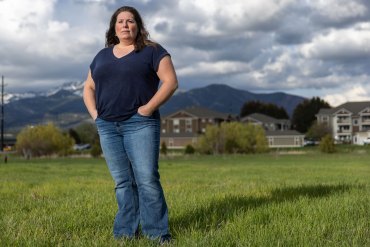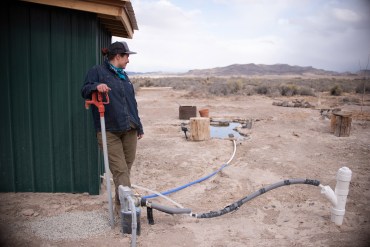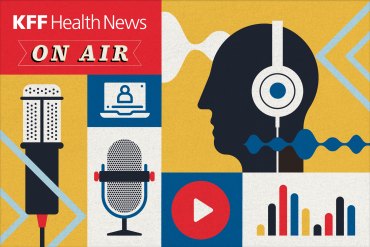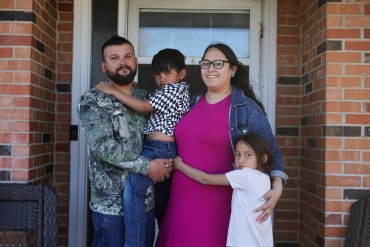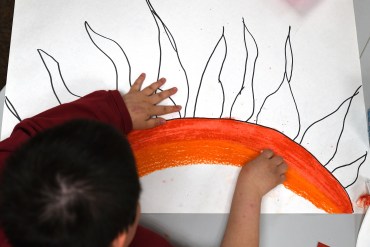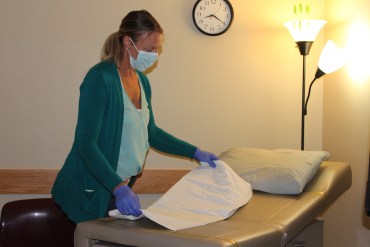Chronic Lifeguard Shortage Serves as Springboard to Address Racial Inequities
Cities and towns are again in deep waters this summer trying to hire enough lifeguards to open their public pools. Many are proceeding with sensitivity to issues of race and ethnicity.
Massage Therapists Ease the Pain of Hospice Patients — But Aren’t Easy to Find
The pandemic disrupted the massage industry. Now those who specialize in hospice massage therapy are in demand and redefining their roles.
As Medicaid Purge Begins, ‘Staggering Numbers’ of Americans Lose Coverage
In what’s known as the Medicaid “unwinding,” states are combing through rolls to decide who stays and who goes. But the overwhelming majority of people who have lost coverage so far were dropped because of technicalities, not because officials determined they are no longer eligible.
More States OK Postpartum Medicaid Coverage Beyond Two Months
Montana, Alaska, Mississippi, Missouri, South Dakota, Texas, Utah, and Wyoming are among the latest states moving to provide health coverage for up to a year after pregnancy through the federal-state health insurance program for low-income people.
A Catch-22 for Clinics: State Bans Limit Abortion Counseling. Federal Title X Rules Require It.
Family planning clinics are getting caught between state abortion bans and a federal requirement to refer patients for abortion care on request.
This Panel Will Decide Whose Medicine to Make Affordable. Its Choice Will Be Tricky.
Colorado’s new Prescription Drug Affordability Board could cap what health plans and consumers pay for certain medications starting next year. The process will pit patient groups against one another.
Domestic Violence Shelters Move Out of Hiding
A new domestic violence shelter in Bozeman, Montana, reflects efforts nationwide to rethink the model that keeps survivors of abuse in hiding. But there are no guidelines for bringing shelters out into the open, leaving each to make it up as they go.
As Water Levels Drop, the Risk of Arsenic Rises
As the West grapples with a megadrought, its driest spell in at least 1,200 years, rising levels of arsenic — a known carcinogen — in Colorado’s San Luis Valley offer clues to what the future may hold.
A medida que bajan los niveles de agua, suben los de arsénico
A medida que el oeste lucha contra una mega sequía que ha durado más de dos décadas y los estados corren el riesgo de recortes en el agua del menguante río Colorado, el Valle de San Luis ofrece pistas sobre lo que el futuro puede deparar.
Refugios para víctimas de violencia doméstica dejan de esconderse
Por mucho tiempo, el estándar para este tipo de refugios, también llamados casas de acogida, ha sido alojar a las víctimas de violencia doméstica en casas ocultas con direcciones secretas
Small, Rural Communities Have Become Abortion Access Battlegrounds
After local leaders in rural Nevada reached an impasse over a proposed Planned Parenthood clinic, an anti-abortion activist pitching local abortion bans across the U.S. arrived at their remote City Hall.
Pequeñas comunidades rurales se han convertido en campos de batalla por el acceso al aborto
La búsqueda por promulgar prohibiciones locales se ha vuelto particularmente crítica en pueblos pequeños, situados en las fronteras entre estados que han restringido el aborto y estados donde las leyes preservan el acceso.
Journalists Unpack Facility School Closures and Federal Investment in Crisis Hotlines
KFF Health News and California Healthline staff made the rounds on national and local media this week to discuss their stories. Here’s a collection of their appearances.
New Mexico Program to Reduce Maternity Care Deserts in Rural Areas Fights for Survival
A federally funded program in remote New Mexico has helped hundreds of pregnant mothers stay healthy, but it’s running out of time and money despite a growing national maternity care crisis. The four-year, nearly $3 million grant has provided telehealth, coordinated care, and social services to mothers in need.
Las empresas quieren que sus IA tomen notas para los médicos y ofrezcan una segunda opinión, suponiendo que puedan evitar que divulgue la información privada de los pacientes.
AI May Be on Its Way to Your Doctor’s Office, But It’s Not Ready to See Patients
Giant corporations like Microsoft and Google, plus many startups, are eyeing health care profits from programs based on artificial intelligence.
Students in Rural Colorado Are Left Without Options as Specialized Schools Close
A new state law aims to keep the doors open at schools that accept students with intensive needs. One preteen in rural Colorado shows how the current system leaves some students bouncing between institutions far from home.
PBMs, the Brokers Who Control Drug Prices, Finally Get Washington’s Attention
Drugmakers, pharmacies, and physicians blame pharmacy benefit managers for high drug prices. Congress is finally on board, too, but will it matter?
On the Night Shift With a Sexual Assault Nurse Examiner
Montana and other states are trying to increase the number of nurses specially trained to treat survivors of sexual assault.
In Idaho, Taking a Minor Out of State for an Abortion Is Now a Crime: ‘Abortion Trafficking’
Under the nation’s first law of its kind, teens must have parental consent to travel for medical care, including in cases of sexual assault or rape. Any adult, including an aunt, grandparent, or sibling, convicted of violating the criminal statute faces up to five years in prison — and could be sued for financial damages.










